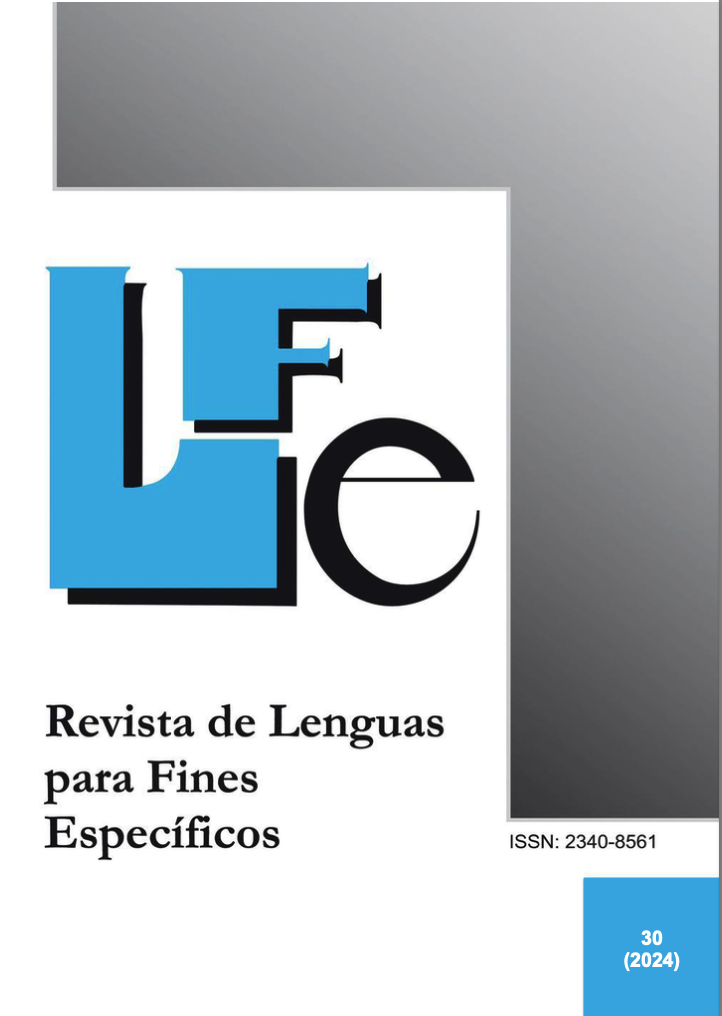Teaching Spanish for Specific Purposes in the occupational field of health sciences
DOI:
https://doi.org/10.20420/rlfe/2024.704Keywords:
didactics of foreign languages, Spanish for professional purposes, ESL, medical Spanish, specialised languagesAbstract
This article describes the importance of teaching Spanish for specific purposes focused within the context of the health sciences and its relevance for employment in the United States. First, the characteristics of teaching for specific purposes, the concept of specialty languages and its differences with traditional foreign language teaching are presented. Subsequently, the place that Spanish occupies at the international level in various aspects of economic and cultural life, such as international trade, diplomacy and health services, among others, is presented, as well as its undisputed place as the second language of use in the United States. Finally, the above is illustrated by describing the operation of the Medical Spanish and Global Health program taught at the Universidad Anahuac-Veracruz in Mexico to U.S. medical students as well as the perspectives of the program's graduates through a series of interviews.
Downloads
References
American Council on the Teaching of Foreign Languages (ACTFL) (2022) Oral Proficiency Interview (OPI) Description <https://www.actfl.org/assessment-research-and-development/actfl-assessments/actfl-postsecondary-assessments/oral-proficiency-interview-opi> [14/01/2023]
Acosta Corte, Á. (2013). La adquisición y el desarrollo lingüístico de los hablantes de herencia de español: Un estudio de caso basado en la investigación-acción en el aula. Revista Nebrija de Lingüística Aplicada 13.
Aguirre B., Sánchez J. y Santos I. (2012) ‘La enseñanza-aprendizaje del español para fines específicos: marco general’, in S. Robles Ávila & J. Sánchez Lobato Teoría y práctica de la enseñanza-aprendizaje del español para fines específicos. (pp. 13-38) España: Universidad de Málaga.
Byrne, P. S. and Long B. E. L. (1976). Doctors Talking to Patients: A Study of the Verbal Behaviour of General Practitioners Consulting in their Surgeries. Exeter: Royal College of General Practitioners
Cabré, Ma. T. and Gómez Enterría J. (2006) La enseñanza de los lenguajes de especialidad. La simulación global. Madrid: Gredos.
Fernández Vítores, D. (2014) El español en el sistema de las Naciones Unidas. <https://cervantesobservatorio.fas.harvard.edu/sites/default/files/004_informes_dfv_espanol_sistema-nu.pdf > [20/12/2022]
Instituto Cervantes (2022) El español: Una lengua viva. Informe 2022 https://cvc.cervantes.es/lengua/espanol_lengua_viva/pdf/espanol_lengua_viva_2022.pdf [14/12/2022]
Instituto Cervantes (2002)Marco Común europeo de referencia para las lenguas: Aprendizaje, enseñanza, evaluación. https://cvc.cervantes.es/ensenanza/biblioteca_ele/marco/default.htm [10/01/2023]
Jiménez Jiménez, J. C. (2009), El poder de compra del español en el mundo, Revista de Occidente, 335, 21-36.
Jones, Rodney H. (2015) Discourse and health communication in D. Schiffrin et al (Eds.) The handbook of discourse análisis (pp. 841-857) West Sussex: John Wiley & Sons.
Rodríguez-Piñero Alcalá A. y García Antuña M. (2009) Lenguas de especialidad y lenguas para fines específicos: Precisiones terminológicas y conceptuales e implicaciones didácticas in Instituto Cervantes Actas del XX Congreso Internacional de la Asociación para la Enseñanza del Español como Lengua Extranjera (ASELE), V. 2. (pp. 907-932). España: Instituto Cervantes.
Shifko, Peter. (2001) ¿Existen las lenguas de especialidad? in M. Bargalló et all. (Eds.) Las lenguas de especialidad y su didáctica, (pp. 21-29) Tarragona: Universidad Rovira et Virgili.
ten Have, P. (1989). The consultation as a genre. In B. Torode (Ed.), Text and Talk as Social Practice (pp. 115-135) Dordrecht: Foris Publications.
Downloads
Published
How to Cite
Issue
Section
License
Copyright (c) 2024 Alejandro Elizondo Romero

This work is licensed under a Creative Commons Attribution-NonCommercial-NoDerivatives 4.0 International License.
Authors who publish with this journal agree to the following terms:
- Authors retain copyright and grant the journal right of first publication with the work simultaneously licensed under a Creative Commons Attribution License that allows others to share the work with an acknowledgement of the work's authorship and initial publication in this journal.
- Authors are able to enter into separate, additional contractual arrangements for the non-exclusive distribution of the journal's published version of the work (e.g., post it to an institutional repository or publish it in a book), with an acknowledgement of its initial publication in this journal.
- Authors are permitted and encouraged to post their work online (e.g., in institutional repositories or on their website) prior to and during the submission process, as it can lead to productive exchanges, as well as earlier and greater citation of published work (See The Effect of Open Access).

Revista de Lenguas para fines específicos is licensed under a Creative Commons Reconocimiento-NoComercial-SinObraDerivada 4.0 Internacional License.
























